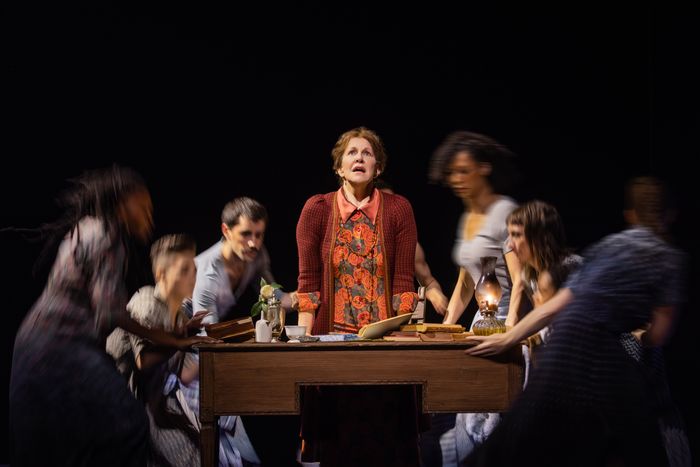
“Mrs. Dalloway said she would buy the flowers herself.”
In Virginia Woolf’s novel, a grand and complicated day springs from that opening line and that first, trivial decision — a day that ends with a gruesome death. In Michael Cunningham’s novel The Hours, the words ring through three women’s lives over most of a century. There’s Woolf herself, who wrestles with sentences and demons; Laura Brown, a mid-century Los Angeles housewife who loses — or finds — herself in Woolf’s prose; and Clarissa Vaughan, whose doomed friend Richard in 1990s New York affectionately calls her Mrs. Dalloway. That meta-story, laced through with phrases and images from its progenitor novel, made it first to the movie screen and now to the Metropolitan Opera’s stage. The trinity-of-divas structure remains intact: Renée Fleming takes over from Meryl Streep as Clarissa, Joyce DiDonato replaces Nicole Kidman as Virginia, and Kelli O’Hara sings the Julianne Moore role of Laura. But far from being a spinoff of a spinoff, Kevin Puts’s The Hours mixes musical freshness and venerable traditions in a fine and moving music drama.
Greg Pierce does a jeweler’s job with the libretto, prying gleaming lines from their place in Cunningham’s prose and resetting them for opera with a minimum of filler. Pierce and Puts both honor the characters’ love of words, no easy feat in a genre where language can devolve into a mush of vowels. Here, music often takes over. Woolf marks the passing of time by Big Ben’s chimes: “Leaden circles dissolved in the air.” In place of that recurring phrase, Puts fills his score with ticking and tolling and repetitive burbles, briefly alluding to Philip Glass’s score for the film, then culminating in remorseless clangs. That’s the sound of the composer nudging the writer aside: I’ve got this.
Cunningham’s novel (like Woolf’s) is full of glittering objects, quivering with significance: a perfect cake; a bunch of flowers; a bird’s deathbed made out of grass. The score, too, shimmers with prettiness, lolling in lavender-and-plum harmonies, savoring the two-note lilt of a harp. This is an opera opera. Puts knows his singers, and he tailors their vocal lines as deftly as Tom Pye costumes them, making performers and listeners happy with all the story’s darkness and misery.
The music leads us through the women’s inner lives, and you couldn’t ask for a lusher trio than Fleming, DiDonato, and O’Hara (or more committed leadership from the pit than Yannick Nézet-Seguin’s). But at the Met, the opera bursts from that claustrophobic frame into an exuberantly busy show. Secondary roles get deluxe casting, especially Kyle Ketelsen as Richard and the soprano Sylvia D’Eramo as Laura’s desperate neighbor, Kitty. Puts gives the orchestra plenty of chances to glimmer and swell. Dancers (choreographed by Annie-B Parson) flock the stage as the silent voices in the characters’ heads, magically translating thoughts into movement. The chorus thunders the dictates of conscience. Even with all that going on, director Phelim McDermott weaves the separate settings and plots together with deftness and clarity. Self-doubt is the force that powers the plot, and that can often lead to a lot of slumping on beds or kneeling before the audience. McDermott avoids stasis by keeping the cast busy with puttering and preparations, using lighting and a few simple flats that roll around the stage to indicate different eras and psychological states. I was never confused about who was having which problems, or when.
The stories converge, as they must. And if you’re going to bring a melancholy trio of sopranos (two full, one mezzo) onstage for the finale of an opera about parties, a Met audience will think of Strauss’s Der Rosenkavalier. At which point, other elements fall retrospectively into place: roses and waltzes and wisdom and Renée Fleming singing of long-ago youthful love. (Her last Met appearance in 2017 was when she retired from the role of the Marschallin.) It’s a dangerous move to evoke Strauss in an opera already so crammed with echoes of another classic. But Puts mostly pulls it off, braiding female voices into a silver cord and twining them together with despondency and charm.
The three women in Cunningham’s novel have similar experiences in varying times and places. Virginia labors away alongside her husband, Leonard, in her rarefied literary workshop. Laura flees her perfect ranch house and the suffocating tenderness of her husband and son for the impersonal solitude of a hotel room. Clarissa Vaughan tries to rustle up a celebration amid the devastation of AIDS. All three are haunted by disappointment, foreboding, and the feeling that their meticulous efforts will never be enough to undo the damage they have suffered and wrought. Each tries to coax a few sprigs of joy and drops of purpose out of her desolation. They succeed, which makes this an optimistic sort of tragedy: Life turns out to be worth all the trouble, at least for a while. But happiness has a cost, and usually someone else has to pay it — in this case, the men in their lives.
Eventually, the emotions they have in common become a liability for the opera. The first act ends with invigorating sadness, but the second starts off slow and generically glum. Discrete personalities start to liquefy and slosh together, all those gracious lamentations merging in a stream of warm melody. Perhaps for that reason, the piece loses momentum for a long stretch in the second act, and Puts’s light touch becomes uncertain — at least until the awful denouement that we have always known must come. And then the opera bobs gently toward the final curtain, fading beautifully into darkness and resignation.
The Hours is at the Metropolitan Opera through December 15.


